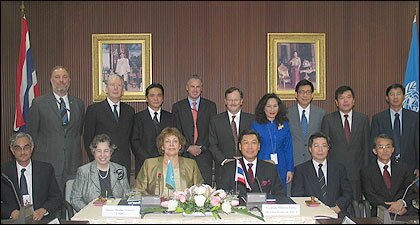 |
|
 |
|
|
|
|||||||||||
|
Press Centre
Press Releases

The United Nations and Thailand sign a new partnership framework, 2007-2011
Bangkok, 7 April 2006
The United Nations and the Government of Thailand signed a new partnership framework today. This framework is based on a two-way exchange of knowledge and expertise, and provides the future direction of cooperation between the United Nations and the Government of Thailand for the next five years.The framework, known as “The United Nations Partnership Framework with the Kingdom of Thailand” outlines five areas of cooperation over the next five years. The five areas are: ensuring equitable access to quality social services, strengthening local governance, increasing HIV/AIDS care and treatment, improving environmental management, and enhancing Thailand’s role as an emerging donor. The United Nations Country Team in Thailand, which consists of 22 agencies, will provide policy advice and technical cooperation. Most cooperation will focus on the poorest parts of Thailand in the North, North East, Southernmost provinces and other border locations. Joana Merlin-Scholtes, the UN Resident Coordinator in Thailand, said today: “Supporting the governments in their efforts to reach ethnic minorities living in the highlands, migrants, displaced persons, and the elderly, will be an important priority for the coming years. These are people who are more prone to fall into poverty and have difficulty in accessing social services.” BACKGROUND NOTES FOR EDITORS 1. While overall poverty is declining, disparities are widening within Thailand. In some areas many vulnerable groups still have difficulties accessing social services and protection. The United Nations (UN) will support government efforts to strengthen social protection services; deliver education for all; and provide health care services and livelihood opportunities for marginalized groups. 2. Promoting good local governance and delivering quality public services is crucial for Thailand. The UN will support administrative and fiscal decentralization, train local government officials to provide better quality services, promote local participatory democracy, and the help provide top quality data for evidence-based decision making. 3. There are concerns about the prevalence of HIV and sexually transmitted infections among vulnerable population groups. Investment in appropriate prevention activities, rather than increasing to meet the challenge, is declining. The UN will focus on improving knowledge, practice, and access of vulnerable groups, to prevention services. The UN will also promote access to care support and treatment services to reduce the burden and socio-economic impact of HIV and AIDS on Thai society. 4. Thailand is facing serious environmental challenges. These challenges are typical for countries at a similar stage of rapid industrialization and urbanization. The UN will promote better use of natural resources, management of biodiversity, renewable energy, water conservation, curbing urban and industrial pollution, and a strategic response to disaster reduction. The UN will work with civil society organizations and build the capacity of communities to share experiences and influence wider policy making processes. 5. Thailand is a success story. The UN will share Thai experiences, such as rapid reduction of poverty, with the global UN network. The UN will also help Thailand to enhance its role as an emerging donor to effectively deliver technical and financial support to other countries in Asia and beyond. 6. The UN will implement this partnership framework with Royal Thai Government’s agencies, Thai Civil Society Organizations, local governments, and community-based groups. Media enquiries, please contact: Fakhrinisso Kurbonshoeva (+66) 02-288-2646 or (+66) 04-6707202 E-mail: Punnipa Ruangtorsak (+66) 02-288-2130 or (+66) 01-398-6064 E-mail: |
@ 2008 United Nations Thailand
